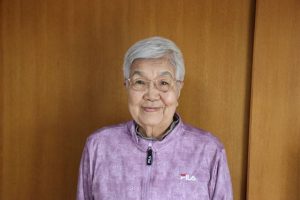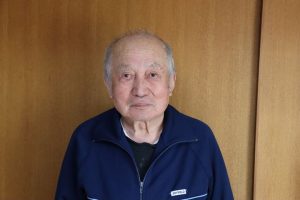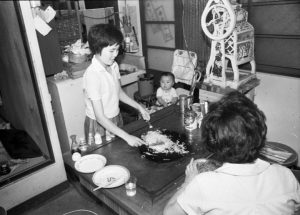Documenting Hiroshima 80 years after the A-bombing: February 15, 1965, okonomiyaki restaurant opened
Apr. 12, 2025
The orphaned couple ran an okonomiyaki restaurant, supporting each other
by Michio Shimotaka, Staff Writer
On February 15, 1965, Toshiko Kajiyama, now 83, opened the okonomiyaki restaurant Kajisan (written in a Chinese character and hiragana) in Hijiyama-honmachi (now part of Hiroshima’s Minami Ward). At the time, she was 23 years old and had given birth to her eldest son the previous summer. She added a four-and-a-half tatami mat restaurant to her house, installed iron plates in it, and took up her spatulas.
Ms. Kajiyama said, “My job was making okonomiyaki, chatting with customers. It’s the best part of my job.” Her husband Noboru, now 84 and formerly an office worker, went to the market at 5 a.m. to buy cabbages and bean sprouts, and cleaned the iron plates after returning from work. Both of them were exposed to the atomic bombing and became orphans. Toshiko said, “I was in the depths of misfortune when I became old enough to understand what was going on around me. I had no choice but to claw my way up.”
On August 6, 1945, Toshiko was exposed to the A-bombing at her home in Kamitenma-cho (now part of Nishi Ward). Her grandfather and other people took her and fled together. She recalls it rained along the way, though her memory of the events is faint. Her mother, who had been mobilized for building-demolition work, never returned.
Her father had died of tuberculosis three years earlier, leaving her an orphan at the age of four. Her maternal grandparents took her in, while her brother, just a year junior, was taken in by her paternal relatives, and they were separated. Ms. Kajiyama said, “I’ve lived my life determined not to be maudlin or become the target of whispered judgment just because I had no parents.” Still, she recalled feeling miserable on Mother’s Day at school when she was given a white carnation instead of a red one because she did not have a mother.
He began working part-time in his fifth year of elementary school
Noboru was exposed to the A-bombing at his home in Hijiyama-honmachi. The whereabouts of his mother, who was seriously injured and taken away on an army relief truck, remained unknown, and her remains were never returned. His father died in the combat in the South in the spring of 1945. Noboru and his younger brother were raised by their grandparents.
Noboru hung up a sock at Christmas but never received any presents. He said, “I suppose my grandparents, who were born during the Meiji era (1868-1912), didn’t know what it meant. Though he was just a child, he worked to survive. In the winter of his fifth year at Minami Elementary School (now in Minami Ward), he began working part-time at a confectionery shop.
Noboru and Toshiko joined a support group for Hiroshima children, formed by Ichiro Moritaki, a professor at Hiroshima University. The group consisted of children who had experienced similar circumstances. They received both physical and mental support, including birthday presents from foster parents. As they grew older, both of them became involved in the Ayumi group, a youth association. However, she said she did not know Noboru and his brother well enough to tell them apart.
In early 1962, talk of their marriage began through the intermediation of Seiichi Nakano, a professor at Hiroshima University who oversaw the group. It all started when a popular TV program called TV wedding, which featured wedding ceremonies held in a television studio, was looking for participants. Toshiko said, “What Professor Nakano, whom I respect, says must be right.” Noboru said, “I followed a fixed plan.” Their wedding ceremony, held on March 27, was broadcast nationwide.
They kept the price of their nikutama-soba dish at 500 yenschool
Mr. and Mrs. Kajiyama opened an okonomiyaki restaurant three years after their marriage. When a shack-like okonomiyaki restaurant across from their house closed, Noboru’s younger brother suggested that they open one themselves. His brother’s family supported them, and sometimes customers looked after their child.
In 1989, they changed the restaurant’s name to KAJISAN (written in all uppercase Roman letters), and they continued running the restaurant until 2024. They were grateful for the support of many people, including their foster parents, and kept the price of their nikutama-soba dish (an okonomiyaki pancake made with sliced pork, egg, and noodles) at 500 yen from the end of the Showa era. (1926-1989).
(Originally published on April 12, 2025)










